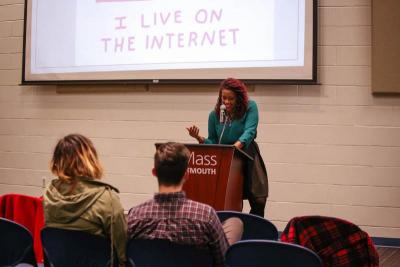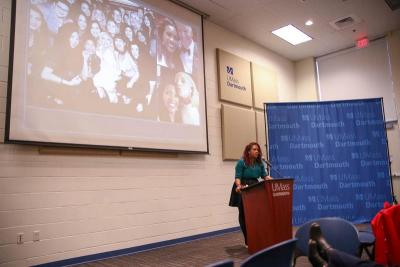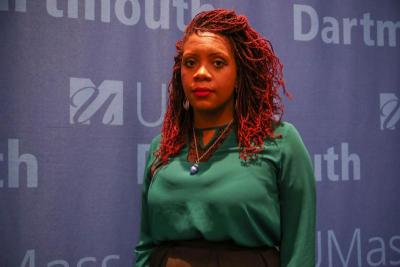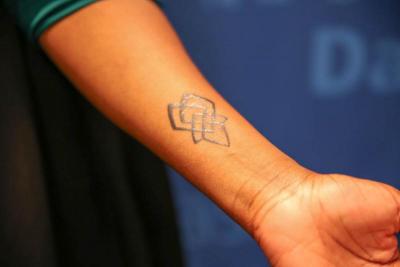Feminist activist shares battle with rape culture on college campuses
UMass Dartmouth has vocally spoken out against sexual assault and on Thursday, April 13, it closed out Sexual Assault Awareness Month with keynote speaker Wagatwe Wanjuki.
Wanjuki is a feminist, social media strategist, vocal activist against campus sexual violence and spokesperson for new media activism. Wanjuki was a student at Tufts University when she found herself in an abusive relationship. On and off for two years, she was subjected to physical and sexual violence. However, she didn’t report her abuser due to fears that she wouldn’t be taken seriously and that she might be discriminated against because she is black, she said. However, after becoming fed up with the strain it put on her, she reported him.
Wanjuki said school officials pretended to be supportive but, behind closed doors, they seemed to think that she lied due to the fact that she waited so long to come forward. In the end, the school took no action against her assailant, and he and all her friends graduated on time while Wanjuki fell behind in her studies due to the mental and emotional toll the situation had taken on her, she said.
Wanjuki later met another student who said she had also had her sexual assault case mishandled by the school. However, though the other student had done “everything right” by getting a rape kit and going to the police in a timely manner, her case was still ignored, Wanjuki said.
The two started a campaign to change the school’s policy but before they could get any traction, Wanjuki was expelled. She appealed her expulsion, and the academic advisor who denied it was her rapist’s advisor, she said.
After going home, Wanjuki began blogging to fill her time. She started a website called rapedattufts.info where she shared her own story. Immediately, the Tufts administration “freaked out,” Wanjuki said.
“So many administrators see rape as a PR problem,” she added. “It felt empowering to control my own story for once.”
In response, Tufts made some changes to their policies. However, Wanjuki wanted change at a national level.
In her research, Wanjuki found that what Tufts did, and what others have said many other colleges do, is illegal. This is because Title XI states that no person can be subjected to discrimination based on their gender, which extends to gender-based violence, Wanjuki said.
“They shouldn’t be expelling survivors,” Wanjuki said.
Wanjuki became involved in many feminist programs including Know Your IXwhich sought to educate people about how to abolish rape culture on school campuses and what their rights are should they ever be sexually assaulted. Wanjuki said she found it difficult to talk to people about a law that wasn’t being enforced, so she suggested the group launch an online petition to bring to the Department of Education.
After securing 180,000 signatures, things really took off. The group was invited to meetings with White House staff, where Wanjuki said people were struck by the level of “institutional apathy.” In the end, President Obama addressed on-campus sexual violence and created a task force to find a solution. One of the group's biggest fights was getting a list of all the schools across the nation that had sexual assault complaints filed against them. After some time, the group won that fight too.
“If I can influence the President of the United States, anyone can do anything,” Wanjuki said.
Today, Wanjuki remains just as vocal about abolishing campus rape and creating penalties for rapists. Most recently, she appeared alongside Lady Gaga and several other survivors at the 2016 Academy Awards when Lady Gaga performed “Until It Happens to You,” a song about her own sexual assault.
Wanjuki told the crowd that everyone can do their part to stop rape culture by debunking harmful myths about rape, speaking against harmful policies that further victimize survivors, and villainizing the rapists, not the victims. She said people should also keep in mind that no one's experience is the same; everything from race, gender identity, sexual orientation, socioeconomic status, and ethnicity shape the way victims cope with rape, and how rapists are portrayed.
“If cheating and plagiarizing is a violation of the code of conduct then they should say rape is too,” Wanjuki said.
















